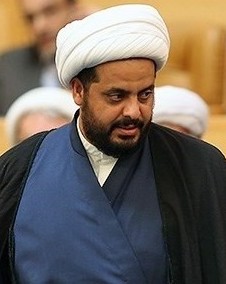Related Research Articles
Saʽid, also spelled Saʽeid, Said, Saïd, Sid, Saeed, Saed, Saied, Sayeed or Sayid, is a male Arabic given name which means "blessed, good luck, joy" or "happy, patient". The name stems from the Arabic verb sa‘ada.
Yasser is an Arabic male name meaning “to be of ease” or “of wealth”.

Imruʾ al-Qais Junduh bin Hujr al-Kindi was a pre-Islamic Arabian poet from najd in the late fifth and early sixth centuries and also the last King of Kinda. He is sometimes considered the father of Arabic poetry. His qaṣīda, or long poem, "Let us stop and weep" is one of the seven Mu'allaqat, poems prized as the best examples of pre-Islamic Arabian verse. Imru' al-Qais was born in the Al-Qassim Region of northern Arabia sometime in the early 6th century. His father was said to be Hujr bin al-Harith, the Kindan regent over the Arab tribes of Asad and Ghatafan, and it is believed that Imru' al-Qais was born in the territory of Asad. His mother was said to be Fatimah bint Rabi'ah al-Taghlibi.
Ayman is an Arabic masculine given name. It is derived from the Arabic Semitic root for right, and literally means righteous, on the right, right-handed, blessed or lucky.
Ahad is a Middle Eastern given forename primarily used by Muslims and Jews. It is also used as a family name (surname).
Rayan, also spelt Rayyan, Rayyaan,RayaanRaian, is generally a given name of Arabic origin, usually male but sometimes female, meaning "watered", "luxuriant", "plentiful" or "heaven's flower" in Arabic.
Kazem means "tolerant", "forgiving", and "having patience" is an Arabic male given name. Although the pronunciation of the Arabic letter Ẓāʾ is often closer to a strong "d" sound, given the prevalence of the name in Greater Iran, and subsequent cultural exchanges between Persia and Indian Subcontinent, Central Asia and Anatolia, the letter is commonly pronounced as Z. Thus the name's pronunciation differs based on location and consequently in its transcription. The most notable person to be awarded with this epithet was Musa-Al-Kadhim, the seventh Shia Imam, who is revered by both Sunnis and Sufis too.
Hamdani or al-Hamdani may refer to:
ʻAbd al-Rashīd is a male Muslim given name, and in modern usage, surname. It is built from the Arabic words ʻabd and al-Rashīd, one of the names of God in the Qur'an, which give rise to the Muslim theophoric names. It means "servant of the right-minded".
Aliya, Aaliyah, Alia or Aliyah is an Arabic feminine given name. It is the feminine of the name Ali, meaning "exalted".

Qais Hadi Sayed Hasan al-Khazali is an Iraqi politician and militant leader who is the founder and Secretary-General of the Asa'ib Ahl al-Haq, an Iraqi Shi'ite paramilitary organization and political party. He is best known as the founder and leader of the Iran-backed Special Groups in Iraq from June 2006 until his capture by British forces in March 2007. As head of the Special Groups, Khazali directed arms shipment, formation of squads to participate in fighting, and insurgent operations, most notably the 20 January 2007 attack on American forces in Karbala. A former follower of Muqtada al-Sadr, he was expelled from the Mahdi Army in 2004 for giving "unauthorized orders" and founded his own group: Asa'ib Ahl al-Haq (AAH) also known as the "Khazali Network" that was later designated as a terrorist group by the U.S. Department of State. During his incarceration, Akram al-Kaabi became acting commander of the organization until his release in January 2010.
ʻAbd al-Munʻim is a masculine given theophoric Arabic name that means "servant of the Most Benefactor or Granter (God)". It is also used as a surname. The name is also rendered as Abdulmon'em, Abdulmonim, Abdulmunim, Abd al-Monem, Abdul Monem and others. Notable people with the name include:
Imad is an Arabic masculine given name and surname and means "support" or "pillar".
Alawi means "follower of Ali" or "descendant of Ali", and is a common surname in the Muslim world. In Arab countries occupied by the British Empire, the name is transliterated as "Alawi". In Arab countries that were occupied by the French Third Republic, the name is transliterated as "Alaoui". In South Asia it is usually transliterated as "Alavi" or "Alvi".
Maysoon is an Arabic given name for females, meaning "beautiful face and body". Notable persons with that name include:
Sarmad, also transliterated as Sarmed, is a masculine Persian/Arabic given name meaning "eternal" or "everlasting". The name is also given to Christian male babies born in the Middle East. Notable people with the name include:

Al-Sadiqoun Bloc or just Al-Sadiqoun is a Shia Islamist religio-political / electoral coalition in Iraq led by Adnan Fihan Moussa Cheri.

Sweden is home to one of the largest communities of the Mandaean ethnoreligious group, numbering between 10,000-20,000 people (2019). By comparison, there are now only about 3,000 Mandaeans in Iraq. Several thousand Swedish Mandaeans were granted asylum status as refugees from persecution in Iraq and Syria. Sweden is currently home to the largest Mandaean community in Europe.
Yaseen is an Arabic-based name and a variant of Yasin, Yassin, Yassine and Yacine. It is an Arabic-based unisex name used frequently in the Arab World and in Muslim countries, and a surname. The name comes from a chapter (surah) of the Quran called Ya-Sin. It is an epithet of the Islamic prophet Muhammad.
Safaa, or Safa, is the gender-neutral name derived from the Arabic word Safa, which means "purity", "innocence". Notable people with this name include:
References
- ↑ Ivins, Holly (June 2010). 10,000 Baby Names: How to choose the best name for your baby. Hodder & Stoughton. ISBN 978-1-905410-73-6.